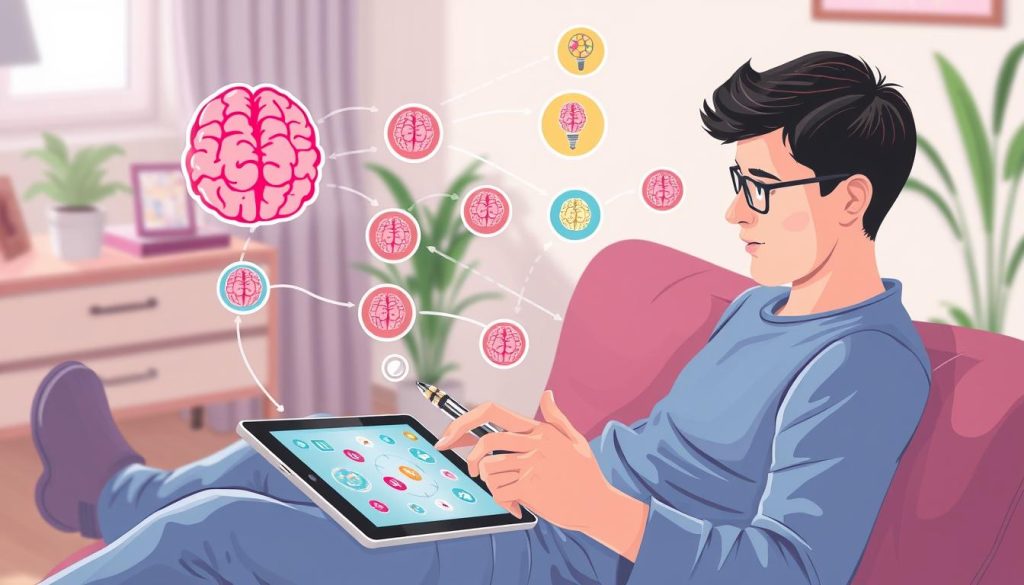Everyone experiences moments of forgetfulness, especially when life gets busy. While this can be normal, having a poor memory can be frustrating. Genetics play a role in memory loss, particularly in serious neurological conditions.
However, research shows that diet and lifestyle significantly impact brain health and memory retention. This comprehensive guide explores evidence-based strategies to enhance cognitive function and mental clarity at any age. By examining how everyday lifestyle choices affect brain function, we can identify effective ways to improve memory.
You’ll discover practical techniques to boost cognitive abilities, maintaining optimal health and information processing. These methods work by enhancing neuroplasticity, your brain’s ability to form new neural connections throughout life.
The Science Behind Memory and Concentration
Research into the science behind memory and concentration reveals the intricate mechanisms that govern these cognitive functions. The human brain has an astonishing ability to adapt and change, a concept known as neuroplasticity.
How Your Brain Forms and Stores Memories
Memory formation involves complex processes in multiple brain regions, particularly the hippocampus, which plays a crucial role in converting short-term memories to long-term storage. Neuroplasticity allows the brain to create new neural pathways throughout life.
The Relationship Between Memory and Concentration
Concentration and memory are interdependent cognitive functions; you cannot effectively form memories without focused attention during the encoding process. The prefrontal cortex manages both working memory and attentional control, explaining why improvements in one area often enhance the other.
Physical Exercise: A Powerful Brain Booster
Regular physical exercise is a potent tool for enhancing brain health and cognitive function. Engaging in physical activity has been shown to have numerous benefits for overall health, particularly for the brain.
How Exercise Affects Brain Chemistry
Exercise influences brain chemistry by increasing blood flow, delivering oxygen and nutrients, and removing waste products. Aerobic activities stimulate the production of brain-derived neurotrophic factor (BDNF), supporting neuron growth and protection.
Best Types of Exercise for Cognitive Function
Various forms of exercise can enhance cognitive function. Aerobic activities, high-intensity interval training (HIIT), and coordination exercises like dance or tai chi are particularly beneficial. These exercises promote neuroplasticity and improve memory formation and retention capabilities.
The Critical Role of Sleep in Cognitive Function
Sleep plays a crucial role in maintaining cognitive function, impacting our ability to concentrate and remember. Research has shown that sleep is essential for memory consolidation, the process by which short-term memories are strengthened and transformed into long-lasting memories.
Studies have demonstrated the significant impact of sleep on cognitive performance. For instance, a study involving 40 children aged between 10 and 14 years found that those who slept between training and testing for memory performed 20% better than those who were tested on the same day without sleep.
Sleep Cycles and Memory Consolidation
During deep sleep stages, the brain processes and consolidates information gathered throughout the day, transferring memories from short-term to long-term storage. REM sleep is particularly important for processing emotional memories and complex information, enhancing creative problem-solving abilities.
- REM sleep enhances creative problem-solving abilities.
- Deep sleep stages are crucial for memory consolidation.
Practical Tips for Better Sleep Quality
To improve sleep quality and subsequently enhance cognitive function, it’s recommended to establish a consistent sleep schedule and create a sleep-conducive environment—dark, quiet, cool, and free from electronic devices. Adults typically need 7-9 hours of quality sleep per night for optimal cognitive performance.
| Tip | Description | Benefit |
|---|---|---|
| Consistent Sleep Schedule | Go to bed and wake up at the same time daily | Regulates body’s internal clock |
| Sleep-Conducive Environment | Dark, quiet, cool, and device-free | Improves sleep quality |
| Adequate Sleep Time | 7-9 hours for adults | Optimal cognitive function |
Nutrition Strategies to Boost Memory and Concentration
The brain’s performance is heavily influenced by the food we eat, making nutrition a critical factor in memory and concentration. A well-balanced diet rich in essential nutrients supports brain health.

Brain-Boosting Foods and Nutrients
Consuming antioxidant-rich foods like berries and dark leafy greens helps combat oxidative stress, supporting cognitive function. Complex carbohydrates provide a steady glucose release, fueling the brain effectively.
Foods to Avoid for Optimal Brain Health
Limiting excessive sugar consumption and highly processed foods is crucial, as they can impair memory and brain health. A healthy diet is essential for optimal cognitive function.
The Power of Omega-3 Fatty Acids
Omega-3 fatty acids play a crucial role in maintaining brain health and cognitive function. These essential fatty acids, particularly EPA and DHA found in fish oil, have been shown to support overall health, lower the risk of heart disease, reduce inflammation, relieve stress and anxiety, and slow mental decline.
Sources of Omega-3s
Omega-3 fatty acids can be obtained from both fish and non-fish sources. Cold-water fatty fish like salmon, mackerel, sardines, and trout are rich in EPA and DHA, making them superior sources. For those who prefer plant-based options or are allergic to fish, flaxseeds, chia seeds, walnuts, and hemp seeds contain alpha-linolenic acid (ALA), which the body converts to EPA and DHA.
Recommended Daily Intake
Research indicates that a daily intake of 250-500mg combined EPA and DHA is optimal for cognitive benefits. Higher doses may be recommended for specific cognitive concerns. It’s also important to maintain a balanced ratio of omega-3 to omega-6 fatty acids, as excessive omega-6 can promote inflammation.
| Source | EPA + DHA Content | Benefits |
|---|---|---|
| Salmon | 1.8-2.2 grams per 3 oz serving | Rich in omega-3s, supports heart health |
| Flaxseeds | Rich in ALA | Plant-based source, supports brain health |
| Fish Oil Supplements | Varies by product | Convenient source of EPA and DHA |
Antioxidant-Rich Foods for Brain Protection
Antioxidant-rich foods play a significant role in shielding the brain from oxidative stress and inflammation. Consuming a diet rich in anti-inflammatory foods may help improve your memory.
Berries, Dark Chocolate, and Green Tea Benefits
Berries are particularly high in antioxidants like flavonoids and anthocyanins, which have been shown to directly benefit neural tissues. Dark chocolate with 70% or higher cocoa content provides flavanols that increase cerebral blood flow, enhancing cognitive performance. Green tea contains L-theanine and catechins that work synergistically to improve attention while providing neuroprotective effects against cognitive decline.
How Antioxidants Combat Cognitive Decline
A recent study involving over 31,000 people found that those who consumed more fruits and vegetables had lower risks of cognitive decline and dementia. Antioxidants help lower inflammation by reducing oxidative stress caused by free radicals, thereby protecting the brain and potentially slowing down cognitive decline.
Mindfulness and Meditation Practices

The practice of mindfulness and meditation offers a powerful tool for improving cognitive function. Regular meditation has been shown to positively affect the brain, enhancing areas associated with attention and memory. By incorporating these practices into daily life, individuals can experience significant cognitive benefits.
Simple Daily Meditation Techniques
Beginners can start with simple focused-attention meditation by concentrating on breath or bodily sensations. Even brief meditation sessions of 10-15 minutes daily can produce measurable improvements in attention span and working memory capacity.
How Mindfulness Improves Focus and Recall
Research has shown that meditation activates key areas of the brain involved in executive function and memory formation. By enhancing metacognition, mindfulness meditation improves information encoding and retrieval, leading to better cognitive performance.
Brain Training Exercises and Games
Brain games and training exercises offer a stimulating way to boost cognitive function. Engaging in these activities can significantly improve memory and concentration.

Digital Apps vs. Traditional Brain Games
Digital brain training apps and traditional games both have their benefits. Apps like Lumosity and Peak offer personalized brain training programs that adjust difficulty based on performance. Traditional games, such as crosswords and Sudoku, provide a more social and tactile experience.
Evidence-Based Brain Training Methods
Research supports the effectiveness of brain training exercises. A study involving 42 adults with mild cognitive impairment showed significant improvement in memory tests after using a brain-training app. Another review of 4,715 people demonstrated enhanced cognitive function through regular online brain training. These findings highlight the potential of brain training to improve memory and cognitive skills in people of various ages.
Learning New Skills as Cognitive Exercise
Acquiring new skills is a potent strategy for enhancing brain function and promoting neuroplasticity. By engaging in novel learning experiences, individuals can stimulate their brain and potentially improve cognitive function. Research has shown that older adults who learn new skills, such as quilting or photography, exhibit enhanced memory function.
Learning new skills creates new neural pathways and strengthens existing connections through the process of neuroplasticity, which continues throughout a person’s time on earth. This concept is supported by a 2014 study that found significant cognitive benefits in older adults who engaged in cognitively demanding activities.
Why Novel Activities Strengthen Neural Connections
Engaging in novel activities, especially those that are complex and combine cognitive, physical, and social elements, provides comprehensive benefits for the brain. Activities like learning a musical instrument or a new language are particularly effective because they challenge the brain in multiple ways.
- Complex activities promote neuroplasticity and strengthen neural connections.
- Learning skills that involve fine motor coordination engages multiple brain regions.
- The initial learning phase of a new skill provides the greatest cognitive benefit.
Recommended Skills to Learn at Any Age
There are numerous skills that people can learn at any age to improve cognitive function. Some examples include:
| Skill | Cognitive Benefits | Additional Benefits |
|---|---|---|
| Learning a new language | Improved memory, attention | Cultural understanding, social interaction |
| Digital photography | Enhanced visual processing, creativity | Social connections through shared interests |
| Cooking new cuisines | Improved memory, following instructions | Nutritional benefits, social sharing |
As highlighted by research, continuously pursuing novel activities is more beneficial than mastering a single skill. This approach keeps the brain engaged and active, supporting overall cognitive health.
“The initial learning phase of any new skill provides the greatest cognitive benefit, which is why continuously pursuing novel activities is more beneficial than mastering a single skill.”
Social Interaction and Cognitive Health
Contrary to the common focus on solitary brain exercises, social interaction is a key factor in maintaining cognitive health. Humans are inherently social creatures, and numerous studies have shown that a life rich in friendships and enjoyable activities comes with significant brain benefits. Interacting with others stimulates our brains, potentially offering the most effective form of exercise.
How Social Connections Stimulate the Brain
Social interaction engages multiple cognitive processes simultaneously, including attention, memory, language processing, and emotional regulation. Meaningful conversations require complex cognitive functions like perspective-taking and memory recall, exercising neural networks more effectively than many solitary activities. This comprehensive stimulation is vital for maintaining cognitive health.
Ways to Increase Meaningful Social Contact
To reap the cognitive benefits of social interaction, focus on building meaningful, emotionally supportive relationships. Engaging in activities like volunteering, which combines social interaction with purposeful activity and learning opportunities, can be particularly beneficial for adults. Prioritizing in-person interactions over digital communication can provide greater cognitive benefits, especially for older people, by potentially reducing the risk of cognitive decline and dementia.
Stress Management for Better Brain Function
The impact of stress on brain health cannot be overstated, emphasizing the need for effective stress management techniques. Chronic stress can lead to significant cognitive impairments, affecting memory, concentration, and overall cognitive function. Understanding how stress affects the brain and implementing strategies to mitigate these effects is crucial for maintaining optimal cognitive performance.
Damaging Effects of Chronic Stress on Memory
Chronic stress triggers the persistent release of cortisol, damaging the hippocampus, a region crucial for memory formation. This damage impairs the ability to form new memories and retrieve old ones. Stress-induced neuroinflammation contributes to cognitive impairment and accelerates brain aging, increasing the risk of neurodegenerative diseases.

Effective Techniques for Reducing Stress
Regular practice of relaxation techniques such as deep breathing, progressive muscle relaxation, and guided imagery can reduce cortisol levels and improve cognitive performance. Meditation is particularly beneficial, as it changes the brain‘s structure, increasing activity in areas associated with positive emotions and improving memory ability. Physical activity also serves as a powerful stress reducer, enhancing cognitive function by decreasing cortisol production and improving sleep quality.
The Role of Laughter and Positive Emotions
The connection between laughter and improved cognitive function is supported by various studies highlighting its neurological benefits. Laughter engages multiple regions across the whole brain, unlike emotional responses which are limited to specific areas.
Laughter triggers the release of endorphins and dopamine, neurotransmitters that enhance alertness, memory, and problem-solving abilities. It also broadens attention and thinking patterns, allowing people to make more creative connections between ideas.
Neurological Benefits
Humor engages multiple brain regions simultaneously, creating neural connections between the analytical left hemisphere and the creative right hemisphere, which aids in learning.
Incorporating Laughter
Simple practices like watching comedy or sharing jokes with friends can increase positive emotions. One effective way to do this is by maintaining a humor journal over time.
| Benefit | Description |
|---|---|
| Endorphins and Dopamine Release | Enhances alertness and problem-solving abilities |
| Broadened Attention | Allows for more creative connections between ideas |
| Neural Connections | Aids in learning and cognitive flexibility |
Practical Memory Techniques and Mnemonics
Memory techniques, known as mnemonics, offer powerful tools for improving information retention. These methods leverage the brain’s natural ability to remember visual, spatial, and emotional information more effectively than abstract or isolated facts.

Visualization and Association Methods
Visualization techniques are particularly powerful because they engage multiple neural pathways, creating redundant memory traces that improve retrieval reliability. Associative techniques that connect new information to existing knowledge create neural networks that facilitate both storage and retrieval of information.
Chunking, Acronyms, and Other Memory Aids
Chunking breaks information into meaningful groups, working with the brain’s natural tendency to process information in units and expanding working memory capacity. Other effective methods include acronyms and the method of loci (memory palace technique), which utilizes spatial memory to dramatically improve recall of ordered information.
When to Seek Professional Help
Experiencing memory loss can be distressing, and it’s essential to understand when it’s necessary to seek professional help. While some memory issues are a normal part of aging, others may indicate a more serious underlying condition.
Distinguishing Normal Forgetfulness from Cognitive Decline
Age-related memory changes typically affect the speed of recall and short-term memory, but not the ability to perform daily activities. In contrast, cognitive decline can significantly impact daily life. If you notice sudden or rapidly progressing memory loss, it’s crucial to consult a doctor.
Medical Conditions That Affect Memory and Concentration
Various diseases, including Alzheimer’s disease, can cause memory loss. Other conditions like heart disease, diabetes, and hormone imbalances can also affect memory and concentration. Certain medications can contribute to cognitive issues; discussing these with your doctor can help identify potential causes.
| Condition | Effect on Memory |
|---|---|
| Alzheimer’s Disease | Significant memory loss and cognitive decline |
| Heart Disease | Mild cognitive impairment |
| Diabetes | Greater cognitive decline |
Creating a Daily Routine for Optimal Brain Health
Establishing a daily routine is crucial for maintaining optimal brain health and cognitive function. A consistent schedule helps regulate the body’s internal processes, leading to improved overall health.
To start, it’s essential to understand the components of a daily routine that support brain health. This includes practices that promote mental clarity and habits that enhance memory consolidation.
Morning Practices for Mental Clarity
Beginning the day with a consistent morning routine can significantly enhance mental clarity. Exposure to morning light helps reset the circadian clock, improving alertness during the day and supporting deeper sleep at night. Incorporating brief mindfulness practices or meditation can also help reset attention and reduce cognitive fatigue.
Evening Habits That Support Memory Consolidation
Establishing a calming evening routine is vital for preparing the brain for optimal sleep quality and memory consolidation. Avoiding screens for at least an hour before bed and minimizing mental stimulation can help signal to the body that it’s time to sleep. Additionally, maintaining a consistent sleep schedule, even on weekends and holidays, supports the body’s natural rhythms.
- Consistent daily routines help regulate the body’s circadian rhythms, optimizing cognitive function.
- Strategic timing of cognitive tasks based on your chronotype can enhance productivity and mental performance.
- Regular meal timing helps stabilize blood glucose levels, preventing energy fluctuations that can impair concentration.
By incorporating these practices into your daily routine, you can significantly improve your brain health and cognitive abilities. Consistency is key; maintaining core elements of a brain-healthy routine even during disruptions provides more benefit than an all-or-nothing approach.
Conclusion
Enhancing cognitive function is achievable through a variety of fun, simple, and delicious methods. By combining physical exercise, proper nutrition, adequate sleep, and cognitive stimulation, individuals can significantly improve their brain health and memory. Consistency is key, as small daily habits yield more substantial long-term benefits than sporadic efforts. The brain’s neuroplasticity allows for cognitive improvement at any age. Implementing a few of these evidence-based strategies can create a positive cycle, making it easier to adopt additional brain-healthy habits over time, potentially reducing the risk of cognitive decline and dementia.


